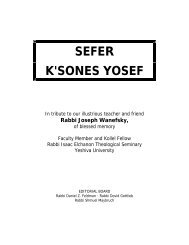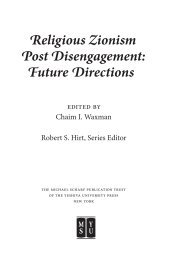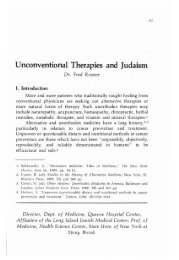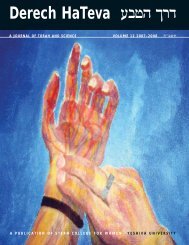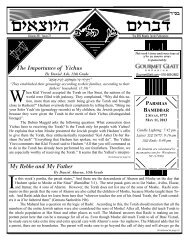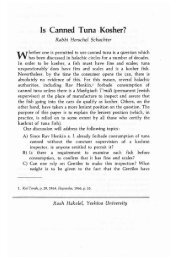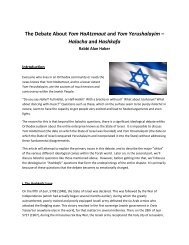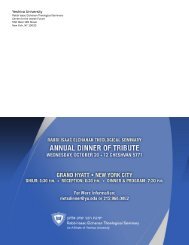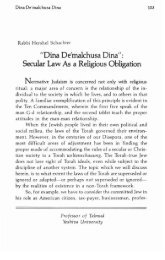yeshiva university • purim to-go • adar 5771 - YU Torah Online
yeshiva university • purim to-go • adar 5771 - YU Torah Online
yeshiva university • purim to-go • adar 5771 - YU Torah Online
- No tags were found...
You also want an ePaper? Increase the reach of your titles
YUMPU automatically turns print PDFs into web optimized ePapers that Google loves.
Remember <strong>to</strong> ForgetRabbi Norman LammRosh HaYeshiva, RIETS and Chancellor, Yeshiva UniversityOriginally given at the Jewish Center in NYC as a derasha for Ki Tetzei 5734 (1974). Excerpted withpermission from “Festivals of Faith” (OU Press and <strong>YU</strong>/RIETS Press, 2011)Memory and forgetfulness are subjects for study by psychologists, neurologists, andcyberneticians. It is for them <strong>to</strong> learn and explain the “how” of these processes, the mechanisms,the dynamics.But these themes are also the substance of spiritual life. Many commandments of the <strong>Torah</strong> refer<strong>to</strong> remembering and forgetting. We are commanded <strong>to</strong> remember, amongst other things: theSabbath; the day we left the Land of Egypt; what the Lord did <strong>to</strong> Miriam - and, thus, theteaching that no one is infallible; how we angered the Lord in the desert - and, therefore, <strong>to</strong> beaware of our own penchant for ingratitude.Similarly, there are commandments concerning forgetfulness. Most prominent is thecommandment of shikhhah - that if one has harvested his field and for<strong>go</strong>tten a corner, he shouldnot return <strong>to</strong> it but must leave that for<strong>go</strong>tten corner for the poor (Deut. 25:19). Even moreparadoxical is a commandment <strong>to</strong> forget (although it is not worded explicitly in that manner).We must forget grudges, insults, hurt. Lo tikkom ve-lo tit<strong>to</strong>r - you shall not take revenge, you shallnot bear a grudge (Lev. 19:18). Forgetfulness is even considered a blessing.Our Rabbis teach us: gezerah al ha-met sheyishtakkah min ha-lev, “it is ordained that the dead befor<strong>go</strong>tten from the heart” (Bereshit Rabbah 84:19). R. Bahya ben Asher pointed out that this is agreat blessing, for if man were always <strong>to</strong> remember the dead, he soon would be laden with suchgrief that he could not survive emotionally or spiritually (commentary <strong>to</strong> Gen. 37:35).But most often, and most usually, forgetfulness is regarded as an evil, as a sin. Thus, the Rabbistaught, Ha-shokheah davar ehad mi-mishna<strong>to</strong> ma‘aleh alav ha-katuv ke-illu mithayyev be-nafsho, “Ifone forgets a single item from his studies, Scripture considers it as if he were guilty with his life”(Avot 3:10).And, of course, the source of all these commandments is the one which gives the Shabbat beforePurim its special distinction and its very name: Shabbat Zakhor. Zakhor et asher asah lekhaAmalek . . . lo tishkah (Deut. 25:17–19) - remember what Amalek, that barbaric and savage tribe,did <strong>to</strong> you . . . you shall not forget.But this commandment not <strong>to</strong> forget is problematic. After all, everyone forgets. Forgetting isnatural, it is part of both our psychological and our physiological selves; it is not a volitional ordeliberate act. How, then, can the <strong>Torah</strong> consider it a sin if we forget?12YESHIVA UNIVERSITY <strong>•</strong> PURIM TO-GO <strong>•</strong> ADAR <strong>5771</strong>



